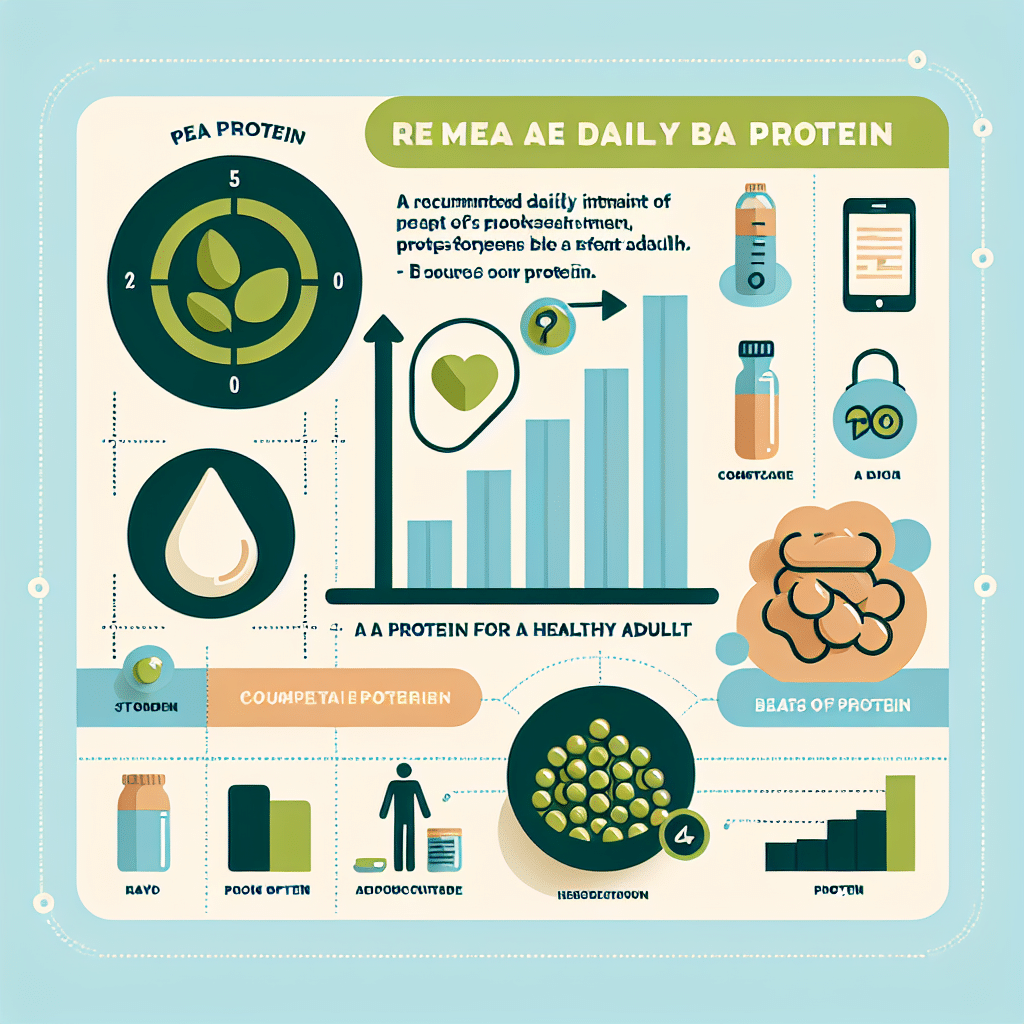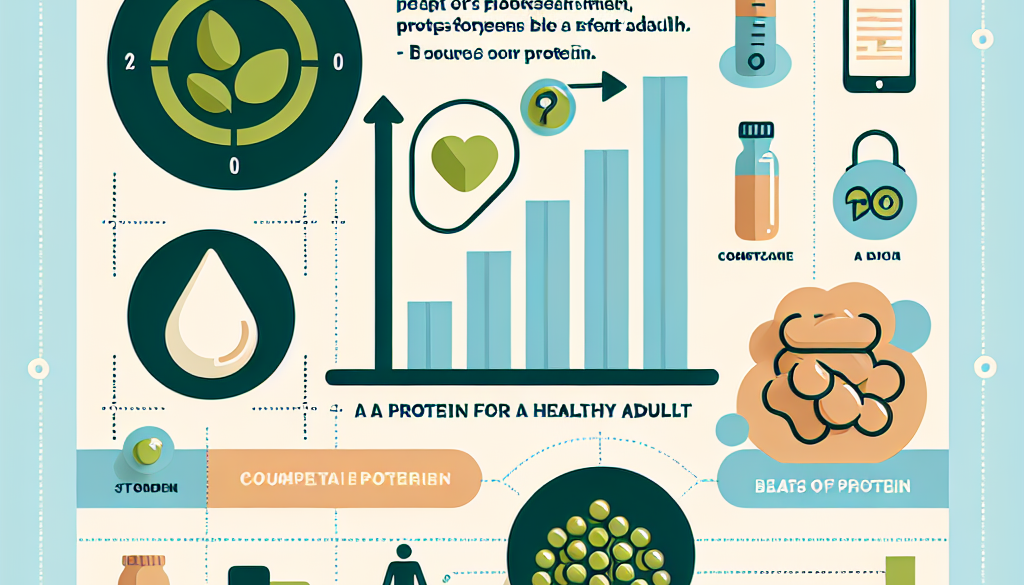How much pea protein can l eat a day?
-
Table of Contents
- Pea Protein Intake: How Much Can You Safely Consume Daily?
- Understanding Pea Protein
- Recommended Daily Protein Intake
- Pea Protein Dosage: How Much Is Too Much?
- Benefits of Pea Protein
- Potential Risks and Considerations
- Case Studies and Research
- How to Incorporate Pea Protein into Your Diet
- Conclusion: Balancing Pea Protein Intake
- Discover ETprotein’s Premium Pea Protein Products
Pea Protein Intake: How Much Can You Safely Consume Daily?

Pea protein has become a popular alternative to animal-based proteins, especially among vegetarians, vegans, and those with dietary restrictions. As a plant-based protein, it offers a range of health benefits and is considered a more sustainable option. However, as with any dietary supplement, it’s important to understand the appropriate daily intake to maximize its benefits without experiencing adverse effects.
Understanding Pea Protein
Pea protein is derived from yellow split peas and is a high-quality protein that contains all nine essential amino acids. It is particularly rich in branched-chain amino acids (BCAAs) like arginine, which are crucial for muscle growth and repair. Pea protein is also hypoallergenic, making it a suitable option for those with allergies to dairy or soy.
Recommended Daily Protein Intake
The Recommended Dietary Allowance (RDA) for protein is 0.8 grams per kilogram of body weight for the average adult. Athletes and those with higher muscle mass may require more protein, up to 1.2 to 2.0 grams per kilogram of body weight. It’s important to consider your overall protein intake from all sources when determining how much pea protein to consume.
Pea Protein Dosage: How Much Is Too Much?
While there is no one-size-fits-all answer, most studies suggest that pea protein can be consumed safely within the range of 20-25 grams per serving. However, individual needs may vary based on factors such as body weight, activity level, and overall health. It’s also crucial to balance pea protein intake with other protein sources to ensure a varied amino acid profile.
Benefits of Pea Protein
- Supports Muscle Growth: Pea protein promotes muscle synthesis due to its rich BCAA content.
- Weight Management: High-protein diets have been linked to increased satiety and weight loss.
- Heart Health: Pea protein may contribute to lower blood pressure and improved cardiovascular health.
- Easy Digestion: Being hypoallergenic and easily digestible, pea protein is gentle on the stomach.
Potential Risks and Considerations
Excessive protein intake, regardless of the source, can lead to digestive issues, kidney strain, and other health concerns. It’s essential to monitor your total daily protein consumption and adjust your pea protein intake accordingly.
Case Studies and Research
Several studies have examined the effects of pea protein supplementation on muscle growth, weight loss, and overall health. For instance, a 2015 study published in the Journal of the International Society of Sports Nutrition found that pea protein promoted muscle thickness gains just as effectively as dairy-based whey protein.
How to Incorporate Pea Protein into Your Diet
Pea protein can be added to smoothies, baked goods, or consumed as a shake. It’s a versatile ingredient that can enhance the protein content of various meals and snacks.
Conclusion: Balancing Pea Protein Intake
In conclusion, pea protein is a safe and beneficial addition to most diets when consumed in moderation. Aim for a balanced intake that complements your dietary needs and preferences, and consult with a healthcare professional if you have any underlying health conditions or concerns.
Discover ETprotein’s Premium Pea Protein Products
If you’re looking to incorporate high-quality pea protein into your diet, ETprotein offers a range of organic, non-GMO, and allergen-free pea protein products. Their pea protein is characterized by a neutral taste and high purity, making it an excellent choice for those seeking a reliable protein source.
About ETprotein:
ETprotein, a reputable protein and L-(+)-Ergothioneine (EGT) Chinese factory manufacturer and supplier, is renowned for producing, stocking, exporting, and delivering the highest quality organic bulk vegan proteins and L-(+)-Ergothioneine. They include Organic rice protein, clear rice protein, pea protein, clear pea protein, watermelon seed protein, pumpkin seed protein, sunflower seed protein, mung bean protein, peanut protein, and L-(+)-Ergothioneine EGT Pharmaceutical grade, L-(+)-Ergothioneine EGT food grade, L-(+)-Ergothioneine EGT cosmetic grade, L-(+)-Ergothioneine EGT reference grade and L-(+)-Ergothioneine EGT standard. Their offerings, characterized by a neutral taste, non-GMO, allergen-free attributes, with L-(+)-Ergothioneine purity over 98%, 99%, cater to a diverse range of industries. They serve nutraceutical, pharmaceutical, cosmeceutical, veterinary, as well as food and beverage finished product distributors, traders, and manufacturers across Europe, USA, Canada, Australia, Thailand, Japan, Korea, Brazil, and Chile, among others.
ETprotein specialization includes exporting and delivering tailor-made protein powder and finished nutritional supplements. Their extensive product range covers sectors like Food and Beverage, Sports Nutrition, Weight Management, Dietary Supplements, Health and Wellness Products, and Infant Formula, ensuring comprehensive solutions to meet all your protein needs.
As a trusted company by leading global food and beverage brands and Fortune 500 companies, ETprotein reinforces China’s reputation in the global arena. For more information or to sample their products, please contact them and email sales(at)ETprotein.com today.












